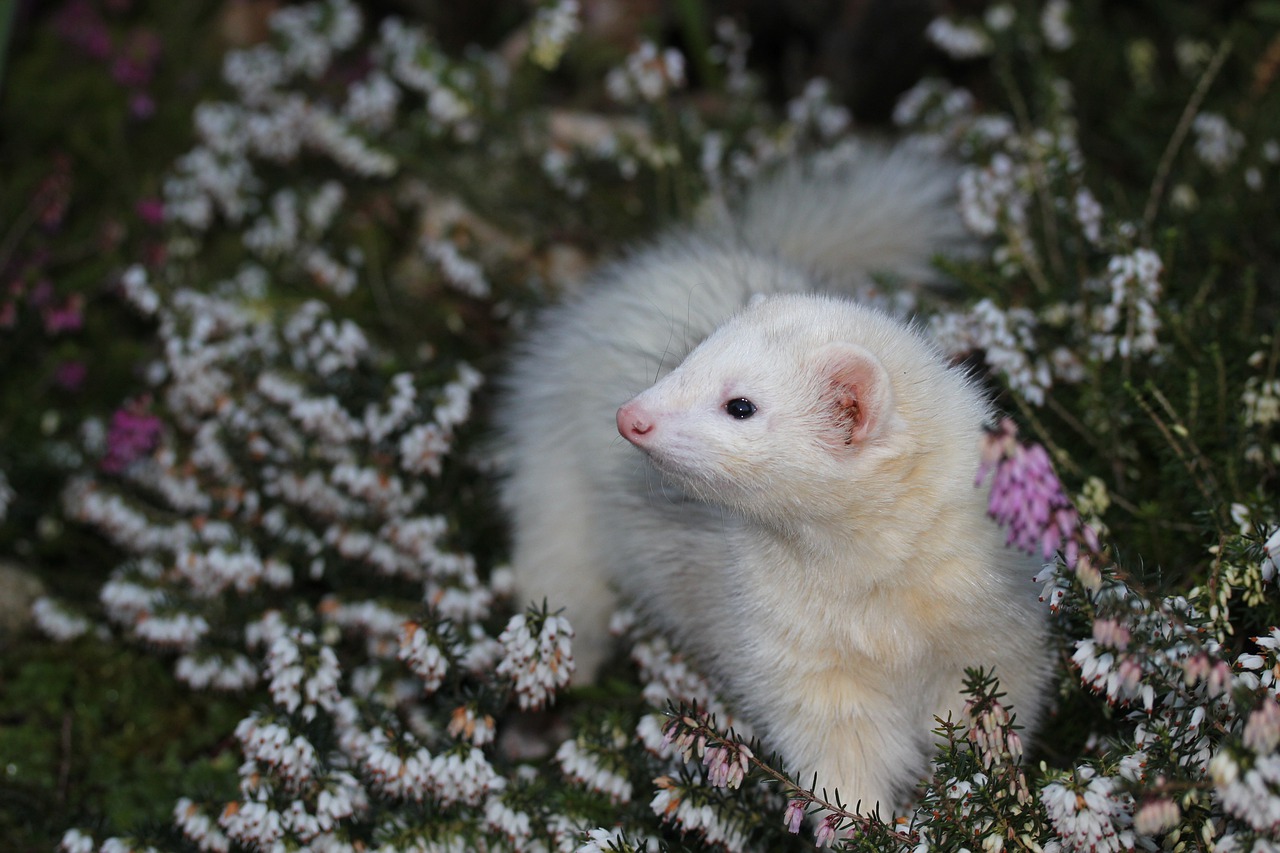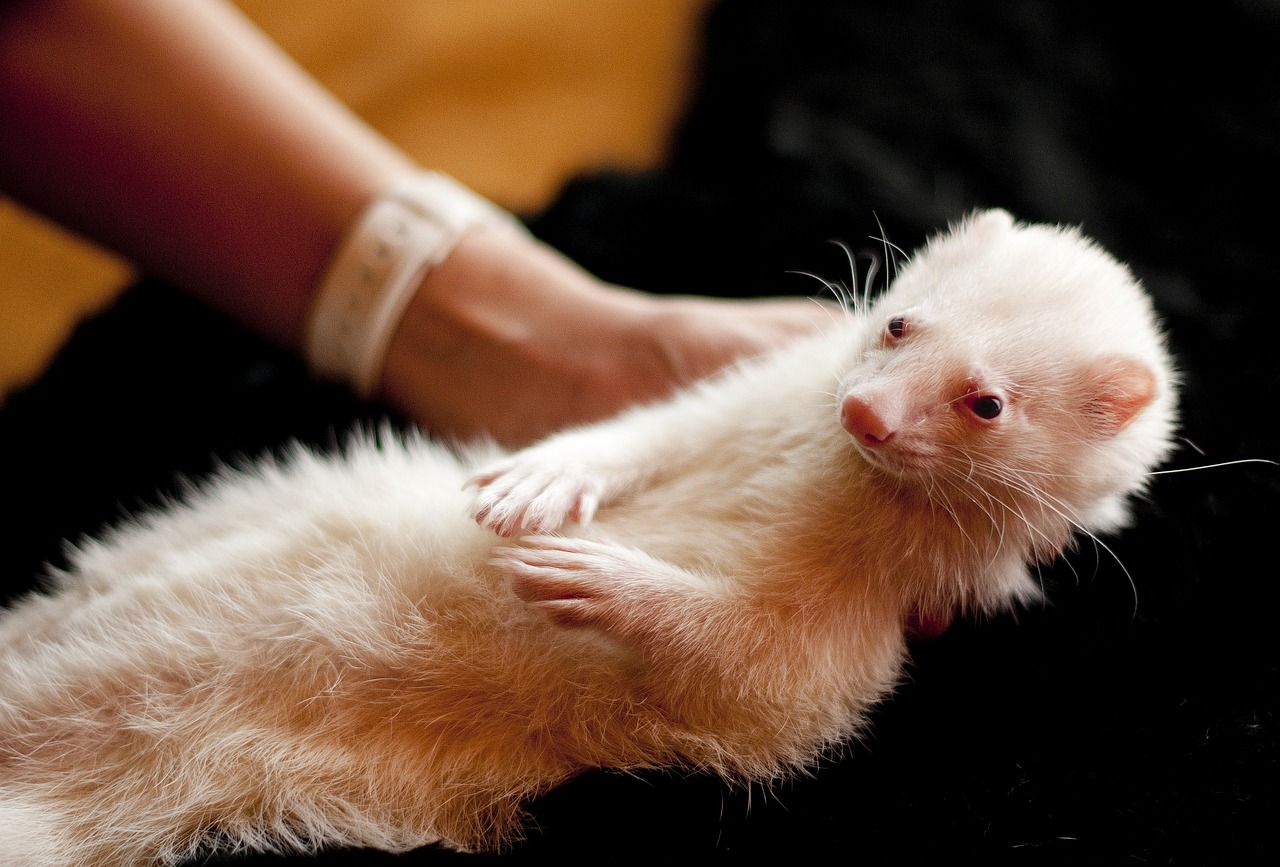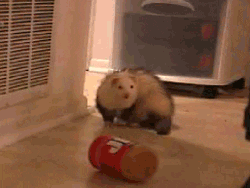What Is a Ferret? The Truth About Who These Fuzzbutts Are
It's hard not to fall in love with a ferret when you see a cage full of them in the pet store. Over the past few decades, these furry creatures have experienced a massive increase in popularity. Sure they're cute and cuddly, but what is a ferret?
Unlike dogs and cats, most know very little about ferrets or how to care for them. They are not just a small pet you leave in a cage. In fact, many people lack the preparation for how much care and attention they do require.
So before bringing one of these little balls of energy into your home, there are a few things you should know.
What Is a Ferret?

Image via Pixabay
A ferret is a small, furry animal with a cone-shaped nose and a long, pear-shaped body. Ferrets have short legs, a tail, and long claws.
They are members of the Mustelidae family, classifying them along with weasels, minks, and others. Ferrets you may see in the pet store are said to be the domesticated form of the European polecat.
These creatures are fun and very popular, though often misunderstood, pets. They can be just as rewarding of a pet as a dog or cat, providing a companionship filled with excitement.
But why is there so much controversy associated with this cute, friendly creature?
Ferrets are not wild animals

Image via Pixabay
A misconception often made by most is that ferrets are feral. Even though they might seem exotic, if you adopt a ferret, you're not bringing a wild animal into your home.
The fact is that humans and ferrets have coexisted for thousands of years. Ferrets were first domesticated as working animals. Much like dogs, they were used for hunting rabbits or controlling pests near farms or granaries.
After so many centuries living side-by-side with humans, pet ferrets are unlikely to survive on their own in the wild. They lack the muscle mass and primitive instincts of their feral relatives.
One relative that may be at fault for the misunderstanding of them being wild is the black-footed ferret. While related, these endangered feral animals are a different species.
So, you want to know, "What is a ferret? They are not rodents either.
That's another common mistake that many people make. They assume that ferrets are a member of the rodent family. They are small and furry, so it’s easy to see how you could confuse the two.
Ferrets are related to that of minks, weasels, and wolverines. Unlike their wild relatives, they’re incredibly safe pets and are often able to coexist peacefully with cats and dogs.
Similar to cats, they are obligate carnivores that hunt rodents and other small prey. So if you keep rabbits, rats, hamsters or mice, a ferret probably wouldn’t be a good addition to your family.
What You Should Know Before Adopting a Ferret
Now that we've answered your question, "What is a ferret?" you may be thinking about adopting one for yourself, and we don't blame you.
However, before you decide to get any pet, you need to know the commitment you're about to make. From getting pets accustomed to your home to figuring out care schedules, new pets take a lot of time and consideration.
Adopting a ferret is no exception to this rule.
While your heart might be ready to shower a ferret with love, it’s essential to consider whether you have enough time, space, and finances to add this furry member to your family.
So, let's go over the basic ferret facts:
Ferrets are social and get into everything

Image via Pixabay
It might surprise you to learn that ferrets bond with their humans for life.
You could even say that like dogs, ferrets are suited to socializing with humans in ways that most pets aren't.
Because ferrets are such social creatures, they’re incredibly demanding of your attention, which is why they do better in groups. They are incredibly playful and friendly and need a lot of freedom to roam, play and exercise.
They must run, tumble, and roll across the floor!
That's why your ferret friend cannot live their entire life in a cage. Ferrets should spend at least four hours outside of their cage every day. And that's the very least.
It's essential to make any necessary modifications in the attempt to ferret-proof your home. Some people even allow their ferrets to roam freely like a dog or a cat, but most wouldn't recommend it.
Remember the old saying, “Curiosity killed the cat?” Well, this is especially true when it comes to your ferret. When let out to roam, ferrets require constant supervision to make sure they aren’t getting into something dangerous -- like chewing on electric cords.
Once you know what is a ferret? You'll see that ferrets can be little troublemakers.
Ferrets possess a toddler's curiosity, and they seem to love getting into trouble. Ferrets have a habit of stealing and stashing everything they can get their little paws and teeth on. The reason behind this behavior is their natural nesting instincts.
Your ferret might steal the toilet paper to line their bedding, or they may collect small shiny or rubber trinkets to treat as surrogate kits. It's good to be aware that anything you don't nail down or put out of their reach is fair game to them.
Ferrets are intelligent and trainable
These are very inquisitive little creatures, so they take readily to basic training. They are quick at recognizing verbal commands for praise and discipline and have excellent memories.
So you ask, "What is a ferret?" They're the best of both worlds.
Similar to dogs, ferrets love attention and will go out of their way to please you. But like cats, they’re also mischievous and like to push your buttons to see what they can get away with.
You can teach them things like using a litter box or how to come when called. Over time they can also learn to stop repeating bad habits, such as nipping at your fingers and toes.
Teaching your ferret to sit, stay, fetch, or play dead might be a little advanced. Although, with patience, your ferret can still learn several fun tricks.
Ferrets can live long lives
For many small pets, like rats and hamsters, their life expectancy is only for a couple of years. However, the lifespan of your ferret is substantially longer.
You can expect most pet ferrets to live anywhere from five to seven years. Healthy and active ferrets free of chronic health conditions can even live to be 10, 11, or 12 years old. That's as old as some dogs.
For you to learn, what is a ferret? You must understand that It's a long term companion.
So, if you adopt a ferret, you need to prepare to spend at least half a decade caring for it. You should also be financially stable to pay for potential expensive vet bills throughout its life.
Routine checkups are a must!

Image via Pixabay
Sadly, ferrets have a high rate of chronic illnesses and cancers. Some of these health conditions include cancer of the lymph nodes, adrenal disease, pancreatic cancer, and even heart disease.
If caught early, these conditions can be treated, so It's crucial to schedule veterinary appointments at least once a year. That way if your pet has a health problem, your veterinarian can hopefully eliminate it before it develops.
Like dogs, ferrets should also get annual booster vaccines against both rabies and distemper viruses. Even though they are indoor pets, there is a risk of you tracking the canine distemper virus from outside.
If you don't plan to breed your ferrets, you should spay or neuter them to prevent other complications. That fact is especially true if you have a female. Female ferrets can suffer from high estrogen levels, which in turn can cause fatal anemia. Spaying your female will prevent this and keep her healthy.
The males don't share this problem, but if left Intact they tend to be more aggressive towards other animals. So it's a good idea to fix them, too.
Luckily, most ferrets you get from a pet store or shelter have already been altered and de-scented.
Some states ban ferrets
Make sure to check with your state to confirm that it's allowed before you consider adopting one.
In some countries, these animals are considered as an invasive, non-native species, making it illegal to import them. Most of the United States allow the ownership of ferrets as pets. However, individual states still have laws regarding them.
Take, for example, the state of California, D.C., and Hawaii. You can't legally own ferrets there and can face stiff punishment if you do.
So, what is a ferret? Well, it's not a pest like some would have you believe.
What one must keep in mind is that most of the fears behind these bans are spawned mainly from misinformation.
Ferrets are messy, but not dirty

via Giphy
Ferrets might get a bad reputation from their similarities to their relatives, but they are not dangerous or dirty pets.
Once you know: What is a ferret? You'll see that ferrets are very clean little creatures.
Like cats, they continuously groom themselves and can develop the habit of using a litterbox if you give them one.
However, ferrets also have a distinctive natural mild odor. Usually, these particular scent glands are removed by a veterinarian when you get your ferret spayed or neutered. After being de-scented, the smell won't be as strong but can still take you a little time to adjust.
You might be tempted to give your ferrets regular baths to get rid of it. While this will remove the smell temporarily, it will only end up making matters worse later. Once a month bathing is more than enough.
Just like any pet, you can still easily reduce the smell in your home by watching their diet and keeping your ferret's bedding and litterbox clean.
Last, but Not Least, Ferrets Are Fun!
So now that we've gone over what is a ferret, let's reflect on what we've learned.
Remember that these little furry pets are members of the Mustelidae family, not rodents. They are fully domesticated and no longer retain the wild instincts of their relatives.
Ferrets are playful, mischievous, entertaining little animals who can bring endless fun and enjoyment. They make cuddly, interactive, spunky pets which can be great for those with the time to care for them.
Beyond their quirky personalities, they have a habit of finding new and exciting ways to create mischief. Your ferret will supply countless surprises and entertain you with their infectious enthusiasm for life!
Do you have a ferret friend of your own? We'd love to hear about your ferret adventures in the comments below!
Featured Image: Pixabay
